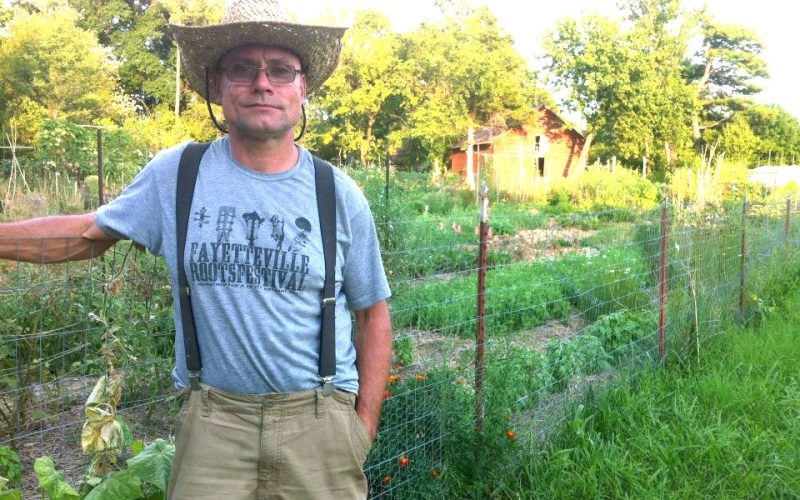By Terrah Baker
 Tri Cycle Farm looks very different from when it first began a year ago this month. With the support of volunteers throughout the community, it’s been taken from a bare piece of freshly-tilled soil to a fertile garden, covered with numerous varieties of vegetables, herbs and beneficial flowers and plants. Now, owner and founding member Don Bennett hopes with a fundraiser kick-off and some innovative food legislation within Fayetteville, that his location, right off Garland and Sycamore, can live up to the name “sustainable urban farm park.”
Tri Cycle Farm looks very different from when it first began a year ago this month. With the support of volunteers throughout the community, it’s been taken from a bare piece of freshly-tilled soil to a fertile garden, covered with numerous varieties of vegetables, herbs and beneficial flowers and plants. Now, owner and founding member Don Bennett hopes with a fundraiser kick-off and some innovative food legislation within Fayetteville, that his location, right off Garland and Sycamore, can live up to the name “sustainable urban farm park.”
Things have been changing and growing fast for Tri Cycle, with a collaboration to fall under a fiscal umbrella of the Omni Center for Peace, Justice, and Ecology, fall crops being planted, educational activities galore, and some motivated individuals taking over responsibilities to help the farm grow faster and more efficiently. All of these aspects are allowing the location to become a hotspot for those looking for a place to garden, learn and eat.
“It’s like a snowball that I pushed and now I’m caught up in it and holding on like the wildest ride I’ve ever been on,” Bennett said. “Several people have taken on some things and are running with them. That’s really what’s going to change how fast this thing is going to take off. That, and how the public has embraced us.”
The Pesto Fest fundraiser, taking place this Sunday, will raise money for items necessary just to move into next season, to include straw and compost bins, but also for more elaborate features like a chicken run with an electric fence — a small, portable enclosure for a chicken that can be moved within the garden for fertilizer and bug control — a rain-water catchment system and a food cart where freshly harvested vegetables and plants will be left at the top of the garden for those who need it.
All funds will be broken down into a clear budget of necessity and how they meet future goals and presented to the Omni Center, who will distribute the funds like a financial grant to Tri Cycle.
“We’re responsible for reporting every penny that comes in and goes out. It’s like we are a nonprofit and we have to report like a nonprofit, which also allows us to go after some grants based on sustainability, education and farming methods we want to put in place here,” Bennett said.
Bennett sees the farm sustaining itself in the future with these grants, as his goals surround education on urban and sustainable farming, and being in a prime location to distribute food and connect like-minded programs. Right now, he is using basil as the farm’s “cash crop,” and sees this practice going into the future with one-third of the food being sold, and the rest going to sustaining the volunteers and community members and programs like the Full Circle Pantry.
In the next few months, Bennett said he sees beginning tilling on the second portion of the garden, and starting to put in place the sustainable practices he has been discussing since the beginning. But first, Bennett and his volunteers are reaching to the community for help, and a little pesto.
Pesto Fest will be held this Sunday, Oct. 7 from 5 – 10 p.m. at The Greenhouse Grille. Music will be provided by The Phosphenes, Candy Lee and the Sweets and Guta. There will be silent auction items, and of course a Pesto taste-off. It’s a $10 donation at the door and $5 to enter the pesto contest. Contact Celeste Gustafson for more information, at celeste.gustafson@gmail.com. For more information on possible ordinances in Fayetteville, go to page 3 of this week’s TFW.

Photo By Kelly Bassemier
Don Bennett stands in front of the garden that is the first completed part of Tri Cycle Farm. Future plans include a pond, small orchard, a second garden, and even farm animals.
Goals of Tri Cycle Farms:
Begin work on a second garden bed within two months
Have an orchard, a pond, chickens and goats that will make up a permaculture, rain garden
Influence Fayetteville’s urban agriculture policy
Build a water catchment system to harvest rain water
Hold educational classes, provide a location for agritourism and events
Sell 1/3 of the food, and donate 2/3 to local pantries and food insecure families



